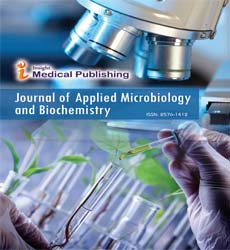ISSN : ISSN: 2576-1412
Journal of Applied Microbiology and Biochemistry
Deciphering the Molecular Dynamics of Microbial Genetics via Genetic Evolution and Adaptation
Alvaro Jean*
Department of Biology, Yale University, New Haven, USA
- *Corresponding Author:
- Alvaro Jean
Department of Biology, Yale University, New Haven,
USA,
E-mail: jean@aliyun.com
Received date: March 23, 2024, Manuscript No. IPJAMB-24-18999; Editor assigned date: March 26, 2024, PreQC No. IPJAMB-24-18999 (PQ); Reviewed date: April 09, 2024, QC No. IPJAMB-24-18999; Revised date: April 16, 2024, Manuscript No. IPJAMB-24-18999 (R); Published date: April 23, 2024, DOI: 10.36648/2576-1412.8.2.217
Citation: Jean A (2024) Deciphering the Molecular Dynamics of Microbial Genetics via Genetic Evolution and Adaptation. J Appl Microbiol Biochem Vol. 8 No.2: 217.
Description
Molecular microbiology serves as the cornerstone of modern microbiological research, delving into the intricate molecular mechanisms that govern the behavior, physiology, and evolution of microorganisms. This interdisciplinary field integrates principles from genetics, biochemistry, and microbiology to elucidate the molecular underpinnings of microbial processes, from metabolic pathways to genetic regulation and host interactions. In this comprehensive exploration, we embark on a journey through the fascinating world of molecular microbiology, unraveling its key concepts, methodologies, and implications across diverse domains. Molecular microbiology continues to drive innovation and discovery across diverse fields, from basic research to applied science and biotechnology. By unraveling the molecular mechanisms of microbial life, we gain insights into fundamental biological processes and harness the power of microorganisms for societal benefit. As technology advances and our understanding deepens, the potential for molecular microbiology to address pressing challenges in human health, environmental sustainability, and biotechnological innovation will only continue to grow.
Molecular microbiology
At the heart of molecular microbiology lies the study of microbial genetics, encompassing the mechanisms of DNA replication, recombination, and repair. How genetic mutations and recombination events drive microbial evolution and adaptation to changing environments. Genome delve into the organization and structure of microbial genomes, from the compact genomes of bacteria and archaea to the more complex genomes of eukaryotic microorganisms. Learn about the role of genome architecture in regulating gene expression and cellular functions. Transcriptional regulation of gene regulation in microorganisms, including transcriptional activators, repressors, and enhancers. Discover how environmental cues and signaling pathways modulate gene expression to coordinate microbial responses to various stimuli. Microorganisms exhibit remarkable metabolic diversity, enabling them to thrive in diverse environments and exploit a wide range of carbon and energy sources. Key metabolic pathways, such as glycolysis, the Tricarboxylic Acid (TCA) cycle, and and their roles in microbial physiology. Nutrient acquisition is investigate the mechanisms by which microorganisms acquire essential nutrients, including carbon, nitrogen, and phosphorus, from their surroundings. Learn about nutrient uptake systems, transport proteins, and metabolic adaptations that enhance nutrient utilization and survival. Microorganisms encounter various environmental stresses, such as heat, osmotic pressure, and nutrient limitation, which threaten their survival. Discover the molecular mechanisms underlying stress responses in microorganisms, including the synthesis of protective proteins, heat shock proteins, and osmoprotectants. Pathogenic microorganisms employ an array of virulence factors to colonize host tissues, evade immune responses, and cause disease. Examine the molecular mechanisms of microbial pathogenesis, including adhesion, invasion, toxin production, and immune evasion strategies. Host organisms have evolved sophisticated immune defense mechanisms to combat microbial infections and maintain homeostasis. Explore the molecular basis of host immune responses, including innate and adaptive immunity, cytokine signaling, and antigen recognition by immune cells. The human microbiota plays a critical role in host health and disease, influencing immune function, metabolism, and tissue homeostasis. Investigate the molecular crosstalk between the microbiota and host cells, and how dysbiosis can contribute to inflammatory diseases, allergies, and metabolic disorders. PCR revolutionized molecular microbiology by enabling the amplification and detection of specific DNA sequences with high sensitivity and specificity. Learn about the principles of PCR, its applications in microbial diagnostics, genotyping, and metagenomic analysis, and recent advances such as quantitative PCR (qPCR) and digital PCR. Next-Generation Sequencing (NGS) technologies have transformed our ability to sequence and analyze microbial genomes, transcriptomes, and metagenomes at an unprecedented scale and resolution. Explore the principles of NGS, its applications in microbial diversity studies, comparative genomics, and functional annotation, and emerging trends such as single-cell sequencing and long-read sequencing platforms. CRISPR-Cas systems have emerged as powerful tools for genome editing and gene regulation in diverse microorganisms, offering unprecedented precision and efficiency. Discover the principles of CRISPR-Cas-mediated genome, editing , its applications in microbial engineering, synthetic biology, and antimicrobial resistance studies, and ongoing efforts to develop novel CRISPR-based technologies.
Applications and implications
Molecular microbiology drives innovation in biotechnology and industrial microbiology, with applications ranging from the production of biofuels, pharmaceuticals, and industrial enzymes to the development of bioremediation strategies and sustainable agriculture practices. Molecular microbiology plays a crucial role in infectious disease control and surveillance, enabling rapid and accurate detection of microbial pathogens, antimicrobial resistance profiling, and epidemiological investigations. The applications of molecular diagnostics, vaccine development, and antimicrobial stewardship in combating infectious diseases and emerging pandemics. Microbial communities play key roles in environmental processes such as nutrient cycling, pollutant degradation, and ecosystem stability. molecular microbiology techniques are used to monitor and manipulate microbial communities in natural and engineered environments, including wastewater treatment, soil remediation, and environmental monitoring.
Open Access Journals
- Aquaculture & Veterinary Science
- Chemistry & Chemical Sciences
- Clinical Sciences
- Engineering
- General Science
- Genetics & Molecular Biology
- Health Care & Nursing
- Immunology & Microbiology
- Materials Science
- Mathematics & Physics
- Medical Sciences
- Neurology & Psychiatry
- Oncology & Cancer Science
- Pharmaceutical Sciences
